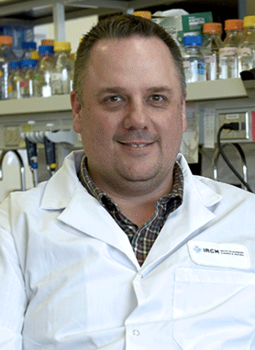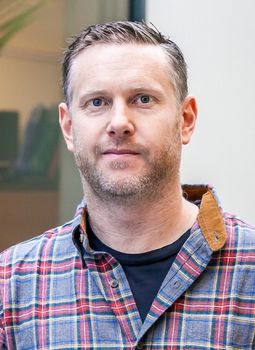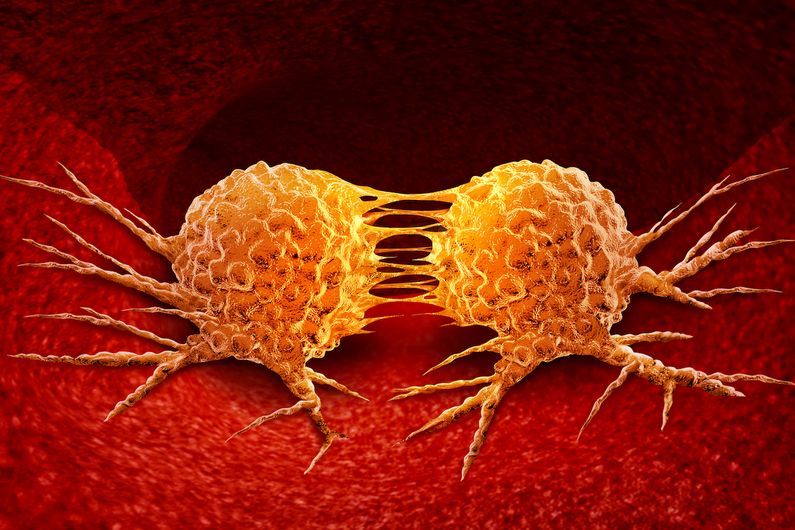New light shed on cell migration
- Salle de presse
08/04/2020
- UdeMNouvelles
Researchers at the IRCM, IRIC and University of Cambridge work together to reveal a mechanism involved in the formation of metastases.
The 3D structure of the ELMO / DOCK2 complex, an important molecular machine that plays a crucial role in cell migration in the body, is now better understood thanks to new research by scientists in Montreal and the United Kingdom.
Working with David Barford of the University of Cambridge, scientists at the Montreal Clinical Research Institute and the Institute for Research in Immunology and Cancer of Université de Montréal, published their results last month in Nature Communications.
Cell migration is fundamental in many ways, including organ formation in the embryo, wound healing, or simply for the delivery of immune system cells to infection sites, the study notes.
However, when deregulated, the ELMO / DOCK complex allows aberrant cell migration and contributes to the formation of metastases, the leading cause of death in people suffering with cancer.
Now, thanks to the collaboration between IRCM researcher Jean-Francois Côté, IRIC researcher Matthew Smith, and Barford in the U.K, thenew study helps unveil the molecular detail underlying the fine-tuning of this “cell movement” machine.
Like a Transformers robot

Jean-François Côté
The research team found that the ELMO / DOCK complex is capable of adopting an inactive form in which different regions of proteins fold and fit into each other, much like a Transformers robot. In this “closed” form, regions of ELMO and DOCK2 known to interact with other proteins are masked and therefore inaccessible. In its “open” form –especially when the RAC1 protein, the mediator of cell migration, is engaged – the complex becomes accessible. It then promotes numerous interactions with its target proteins to ensure cell migration.
“This work has generated a large amount of new information about the ELMO / DOCK complex that will stimulate many future studies around the world,” said Côté, a medical professor at UdeM and vice-president for research and academic affairs at the IRCM. “This information will also provide a better understanding of the way the entire DOCK family operates.”
Demystifying the mechanisms

Matthew Smith
“There are 14 ELMO and DOCK proteins, and several are implicated in human diseases,” added Smith, principal investigator at IRIC and assistant professor of medicine in UdeM’s department of pathology and cell biology.
“This discovery demystifies some of the fundamental mechanisms responsible for the disease. This is therefore a first step that will certainly lead to a better understanding of metastases and cancer cells.”
About this study
"Structure of the DOCK2−ELMO1 complex provides insights into regulation of the auto-inhibited state," by David Barford et al, was published July 10, 2020 in Nature Communications.
About the IRCM
Founded in 1967, the Institut de recherches cliniques de Montréal (IRCM) / Montreal Clinical Research Institute is a non-profit organization that conducts fundamental and clinical biomedical research in addition to training high-level young scientists. With its cutting-edge technology facilities, the Institute brings together 33 research teams working in cancer, immunology, neuroscience, cardiovascular and metabolic diseases, systems biology and medicinal chemistry. The IRCM also operates a research clinic specialized in hypertension, cholesterol, diabetes and cystic fibrosis, as well as a research centre on rare and genetic diseases in adults. The IRCM is affiliated with Université de Montréal and associated with McGill University. Its clinic is affiliated with the Centre hospitalier de l’Université de Montréal (CHUM). The IRCM is supported by the Ministère de l’Économie, de la Science et de l’Innovation (Quebec Department of Economy, Science and Innovation).
About the IRIC
An ultra-modern research hub and training centre located in the heart of the Université de Montréal, the Institute for Research in Immunology and Cancer (IRIC) of the Université de Montréal was created in 2003 to shed light on the mechanisms of cancer and discover new, more effective therapies to counter this disease. The IRIC operates according to a model that is unique in Canada. Its innovative approach to research has already led to discoveries that will, over the coming years, have a significant impact on the fight against cancer.













